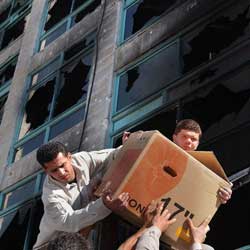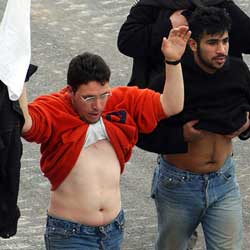Page Not Found


Page Not Found
|
||
Page Not Found
|
||
Page Not Found
|
||
Page Not Found
An interview with “peace activist” Neta Golan.
Human Cameras, Human Shields, Human Targets
“Internationals” inside a war zone in Palestine.
War for War’s Sake
Meet the Coalition of Immokalee Workers.
Terror in the Territories.
Web Exclusive |
Patient Privacy Under Attack Again The sludge report.
Power Mad
Phoenix ascending.
Appall-o-Meter
U.S. considers renewing military ties to Indonesia.
Who’s Counting?
U.S. plan to eradicate coca crops in Bolivia fails miserably.
Testing has killed thousands, a new study shows.
Far-right Cartoonist Strikes Again
Saving Women’s Lives
In Person: Dr. Thoraya Obaid
Little Big Women
BOOKS: Jean Bethke Elshtain dreams of Jane Addams.
BOOKS: John Maynard Keynes’ pursuit of the sublime.
Acquired Tastes
FILM: Trouble Every Day.
Studs Terkel turns 90.
|
April 12, 2002
Scenes from the Occupation
 ��
��
Ramallah, The West Bank
“Ten Israeli soldiers came to our building and asked us to leave,” she said in a phone interview that day. “We went out into the street and waited there until 5:30 in the morning.” Israeli helicopters and tanks bombarded the city around them. The Israeli soldiers in Shaar’s building blew in its front door, damaging her first-floor apartment. Then the building’s residents were herded back inside to spend hours and then days rationing food, cell phone batteries and news of the ongoing Israeli attack. Meanwhile, the soldiers used the remaining apartments as a central command. “We have food,” she said back then. “But we don’t know how long it will last.” As the Israeli army nears its third week of reoccupation of West Bank cities, news of the treatment of Palestinian civilians has caused outrage here and abroad. In Nablus, where Shaar lives, journalists have been banned from covering ongoing events. In Jenin, where ambulances have not been allowed to pick up dozens of corpses left lying in the streets, journalists have had to garner stories from the 300 Palestinians released into a nearby town after being arrested, many of them stripped to their underwear. Ramallah’s 60,000 residents have been holed up at home for nearly two weeks. Here the occupation has begun to settle in. Fighting occurs only sporadically in the eerily quiet city, but sudden death looms. A nurse at the Ramallah Hospital reports that three bodies were brought into the morgue, swollen and stinking from days in the sun. One of the corpses, a man in his fifties, was wearing a Palestinian security uniform. He had been shot in the neck. And then there are the panicked phone calls from neighbor to neighbor. “A woman was shot by a sniper just a few minutes ago as she was hanging up her children’s clothes outside her house. I know her mother. She was so young.” The hospital confirms that a 27-year-old woman was killed by a single gunshot wound to the chest. Ambulances, which coordinate with Israeli authorities to assure their own safe passage, were not allowed to tend to her for 45 minutes. “It is really hard moving around the city,” says Red Crescent’s Dr. Ziad Abu Asia. “I was talking to one of the ambulance guys, and just today he was stopped and searched for two hours.” Outside a house in the Ein Misbah neighborhood, a Merkava tank rumbles to the curb and trains its cannon at the houses in the valley. Eight soldiers get out of an armored personnel carrier and move in formation out of sight. Minutes later, the soldiers return, empty-handed. They are still looking for armed men—police and militia—that roam the valleys. Some 1,000 people have been arrested here, several hundred released after interrogation, and the others detained in Israeli prisons still standing from the first intifada. Israeli lawyers are having trouble tracking the men down. Samar Huwara, who fled her home in the first days of the invasion, returned in a curfew break only to find that the house had been looted by soldiers who had made themselves at home. “The place was a mess,” she says. “My DVD player was gone and most of my CDs. The ones for my son, Snow White and Disney, were left on the floor. The video camera, even the water filter was missing.” Huwara, not one to let the looting pass, approached the soldiers outside and asked for their captain. When she told him what was missing, he looked shocked. “I don’t know if he was pretending, but he said that when I come back all the things would be returned.” Three days later, at the next lifting of the curfew, Huwara went back to her now abandoned house. “I don’t know who did it, but the things that had been thrown on the floor were put back neatly in the cabinet and someone had put all the soldier’s garbage in a trash bag.” Her expensive electronic equipment was still nowhere to be found. On April 2, 30 tanks rumbled up to the Palestinian Ministry of Education. On the second floor, offices have been turned inside out, files dumped on the floor. In the basement finance department, Israeli soldiers detonated a safe. The money and documents that had been inside are missing, say the staff. Also damaged was the computer holding the records of 50 years of Palestinian graduates. “They came to destroy,” says Deputy Minister Naim Abu Hummous, found surveying the damage in the three-hour period that residents were allowed out of their homes. “We did not expect that.”
Most curious are the 11 computers that were methodically stripped of their casings and plucked of their hard drives. “I am very angry,” Abu Hummous says. “I am very upset about this way of dealing with a civilian institution. This way will not bring them peace.” Return to top of the page. |
|
